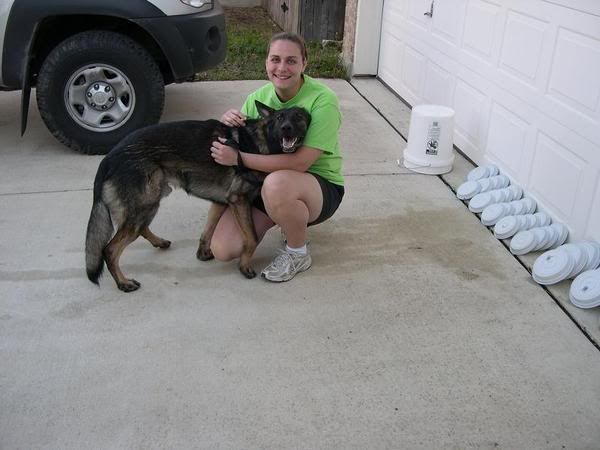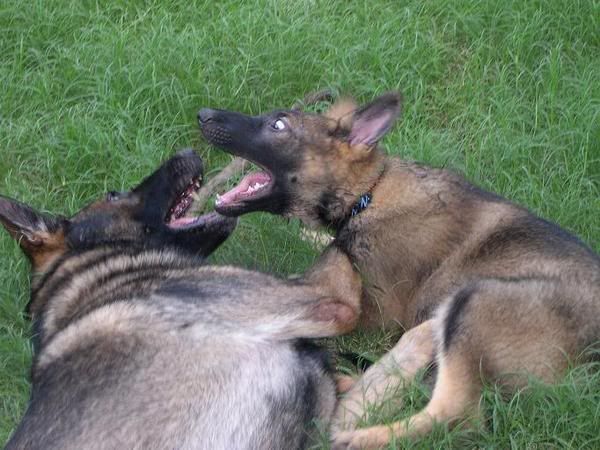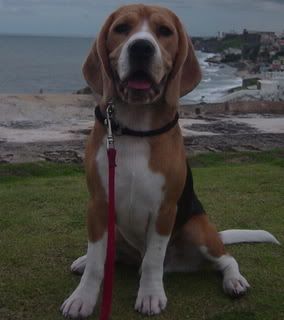 Puppy timetable
#133347 - 03/15/2007 10:19 AM Puppy timetable
#133347 - 03/15/2007 10:19 AM |
Webboard User

Reg: 02-07-2007
Posts: 45
Loc: TX
 Offline Offline |
|
Does anyone know if there is a written-out rough timetable for training puppies? Or, could anyone sketch out a time-table for me? What I mean is, for example, at eight weeks you can start training *this* and at twelve *this* and at sixteen *this* etc. etc. I realize each puppy is different, but I think it would really help me (and maybe some others) to see a time-table written out in one place to go off of (as long as it's not treated as written in stone) I see a lot of this information floating around, but have yet to find it spelled out in a cohesive form in one place. I'm getting a new pup this summer, and this is my first puppy (Bodo was already an adult when we adopted him) so I don't want to move too fast or too slow when training him.
Thanks!
Kameron

|
 Top Top
|
 Re: Puppy timetable
[Re: Kameron Bean ]
#133351 - 03/15/2007 10:47 AM Re: Puppy timetable
[Re: Kameron Bean ]
#133351 - 03/15/2007 10:47 AM |
Webboard User

 
Reg: 07-14-2005
Posts: 775
Loc: Wisconsin
 Offline Offline |
|
Kameron,
I wish there was a chart like this. Before I got my pup who is now 7 months old, I made a chart of what to train when based on the last few pups I had trained.
It didn't work.
Pups mature at different rate, especially among different breeds. What the working GSD pups could start learning at 4 weeks old (still at the breeder, still with the litter) It took my pup until she was 4 MONTHS old.
She's 7 mo old now and I can FINALLY start training her the way I would normally think of training a 4 mo old pup.
The other thing is everybody wants to train the dog to do something else and the order in which things are trained depends on the trainers theory. (Especially when it comes to protection training.)
What do you want to train your pup for?
If you are moving too fast, your pup simply won't remember new cues or won't be able to tell the difference between cues. You'll just have to repeat it for a while before moving on. I really start training when the pup can learn a new cue every day and remember the cues from the days before. This comes somewhere between 4 and 7 mo.
If you are moving "too slow", you'll only do a better job training each individual command. There is no fault in this.
The ORDER in which you train commands is a little bit more important than the age that you train at.
- Train your puppy to come before you train a long stay.
- Don't train your dog to creep or crawl before you train a long down.
- If you train the stand, try to do it as late as possible. It takes some maturity for a pup to be able to do this. My pitmix couldn't learn it until she was almost 3 yrs old. However, I've trained GSD pups the stand before they were 6 mo old. It depends so much on the dog.
Plan your cues in advance. These are bad combinations I have trained:
"Flip" (for come to heel) and "sit." The dog chooses to perform flip because it was the more highly rewarded cue. The dog pretty much can't sit on cue. (How embarassing is that.)
"Platz" (down) and "watch" (look). This dog got some unfair corrections until I realized how stupid I was.
I hope this helps.
|
 Top Top
|
 Re: Puppy timetable
[Re: Kameron Bean ]
#133358 - 03/15/2007 12:16 PM Re: Puppy timetable
[Re: Kameron Bean ]
#133358 - 03/15/2007 12:16 PM |
Webboard User

  
Reg: 01-14-2007
Posts: 264
Loc: Puerto Rico
 Offline Offline |
|
I'll give my $0.02 as long as you're referring to a pet puppy, not a working dog.
I've had my puppy for three weeks (10 week old today). First week and a half he was nameless. Since he was named, I've only 'taught' him his name using a clicker. If called, he now makes eye contact with me if he knows I'm offering treats. When I'm not offering treats, and he's having fun, he will make eye contact some of the time, but sometimes I have to call him a couple of times before he does. Yesterday my friend remarked "he already knows his name!", so I was proud we were doing some progress. Until he's got his name figured out, I don't think I'll teach him anymore tricks.
Other types of training I've been doing is teaching him to pee on command (which he will do... if he has to go, lol). I'm doing the same thing with pooping, but it's obviously a little more difficult. I'm not using a clicker for those, just the "good outside" technique.
Since I feed raw and would like to see my pup drinking more water than he actually does (for my peace of mind), I'm also teaching him to drink water on command, without a clicker as well ("drink water"...... good boy, water).
Other things I'm trying to teach him is to stop biting my hands & arms, and cables, furniture, shoes, etc. This is the most challenging of all IMO. I'm trying to keep my cool even though my arms are really fked up by now. But he has a bad habit of nipping/biting my face, and yesterday he got my nose (drew blood and all) and I automatically (pure reaction) slapped him in his mouth. He's a hard puppy, and was playing right after, but the nipping has stopped since then.... not the hand/arm bitting, though 
I'm in no rush to see my dog sitting on command. That can be taught in one day. Teaching him the meaning of the word "NO" is, IMO, more difficult and important. Also more important is teaching him pack structure, which can't be done overnight either. When you get your puppy, you'll see what I mean.
|
 Top Top
|
 Re: Puppy timetable
[Re: Richard Pryor ]
#133360 - 03/15/2007 12:30 PM Re: Puppy timetable
[Re: Richard Pryor ]
#133360 - 03/15/2007 12:30 PM |
Webboard User

Reg: 02-07-2007
Posts: 45
Loc: TX
 Offline Offline |
|
I appreciate the responses. My puppy will be a working dog - probably ppd, but maybe sport as well. I know each puppy matures differently, but I also know some things (such as bite work?) may be better served to be trained at a later age. I'm just looking for a very loose outline, if that's at all possible.
Kameron
|
 Top Top
|
 Re: Puppy timetable
[Re: Kameron Bean ]
#133362 - 03/15/2007 12:55 PM Re: Puppy timetable
[Re: Kameron Bean ]
#133362 - 03/15/2007 12:55 PM |
Webboard User

 
Reg: 07-14-2005
Posts: 775
Loc: Wisconsin
 Offline Offline |
|
Kameron,
Again, there's no rights and wrongs, but a lot of different training patterns out there and good reasons for each one.
It depends on your specific goals. Are you training for high points at trial? Are you training for a fun experience with your dog? Are you training for personal protection first and then applying the training to sport because it can be done? These types of questions determine what training is most important and gets the most attention, first.
For instance, if you want to train for high points at trial, you'll begin by spending all your time on grip development. The trade-off is you'll need to use more compulsion and/or "mind games" in obedience. You will need to get the DVDs that Ed made with Bernard Flinks.
If you are training for a fun experience with your dog, you would do a lot of clicker imprinting at first, still play tug games, but not stress so much on the grip. This is more the style of Mike Ellis - an excellent trainer I might add.
If you first need a protection dog, then you'd want to get a couple of Ed's DVDs. I think it is "Bite Training Puppies" or maybe "Beginning of Defense" ? that shows how to teach the puppy "If you bark the scary man will go away." In a protection dog first, you'd want to carefully develop a defense drive (when the dog becomes mature) and focus on poison-proofing etc. While obedience is always important, trial exercises (jumps, retrieves, tracking) don't need to be addressed.
The only consistent thing I know of is "track early, track often."
Edited by Anne Vaini (03/15/2007 01:09 PM)
Edit reason: spelling
|
 Top Top
|
 Re: Puppy timetable
[Re: Richard Pryor ]
#133416 - 03/15/2007 07:31 PM Re: Puppy timetable
[Re: Richard Pryor ]
#133416 - 03/15/2007 07:31 PM |
Webboard User

Reg: 02-09-2007
Posts: 356
Loc: Maine
 Offline Offline |
|
Just my two bits, I like the idea of having trained the sit first. I make him sit at the door, to go in or out. I make him sit for his meals. He sits to get out of his crate, unless he has remained laying down. He sits after getting out of my van, and before getting into my van. I have him sit during fetch. I find it is easier for him to drop (drop fetch toy to the ground) or to release (release while I am holding the toy).
Sit is his most solid command. Come Puppy was pretty good to ... but just drop that leash and then try to see how good your come is. NOT. So we're still working the come.
Today we did walking on a short leash and although he pulled, not too badly, as typically we use the flexi leash and we all know the give it has. But while on the short leash if he started pulling too hard, what did we do? SIT!
Needless to say, I am a BIG Fan of the SIT.
|
 Top Top
|
 Re: Puppy timetable
[Re: Louanne Manter ]
#133422 - 03/15/2007 08:00 PM Re: Puppy timetable
[Re: Louanne Manter ]
#133422 - 03/15/2007 08:00 PM |
Webboard User
   
Reg: 08-29-2006
Posts: 2324
Loc: Central Coast, California
 Offline Offline |
|
Needless to say, I am a BIG Fan of the SIT.
So am I, Louanne.
That was my pup's first learned command, the easiest to teach, and the one he does the best. DOWN comes in a very close second.
Everything else is still a work in progress. 
True
 |
 Top Top
|
 Re: Puppy timetable
[Re: Sarah Morris ]
#133488 - 03/16/2007 09:53 AM Re: Puppy timetable
[Re: Sarah Morris ]
#133488 - 03/16/2007 09:53 AM |
Webboard User

Reg: 02-09-2007
Posts: 356
Loc: Maine
 Offline Offline |
|
Down is a crap shoot still. Even when he goes down, he struggles with staying down. So now I am mixing that in at meal times exchanged with the sit.
|
 Top Top
|
When purchasing any product from Leerburg Enterprises, Inc. it is understood
that any and all products sold by Leerburg Enterprises, Inc. are sold in Dunn
County Wisconsin, USA. Any and all legal action taken against Leerburg Enterprises,
Inc. concerning the purchase or use of these products must take place in Dunn
County, Wisconsin. If customers do not agree with this policy they should not
purchase Leerburg Ent. Inc. products.
Dog Training is never without risk of injury. Do not use any of the products
sold by Leerburg Enterprises, Inc. without consulting a local professional.
The training methods shown in the Leerburg Ent. Inc. DVD’s are meant
to be used with a local instructor or trainer. Leerburg Enterprises, Inc. cannot
be held responsible for accidents or injuries to humans and/or animals.
Copyright 2010 Leerburg® Enterprises, Inc. All rights reserved. All photos and content on leerburg.com are part of a registered copyright owned by Leerburg Enterprise, Inc.
By accessing any information within Leerburg.com, you agree to abide by the
Leerburg.com Privacy Policy and Terms of Use.
 Previous Topic
Previous Topic Index
Index Next Topic
Next Topic














 Top
Top






